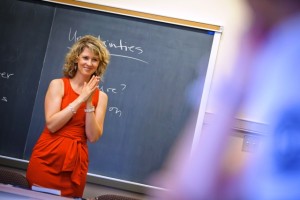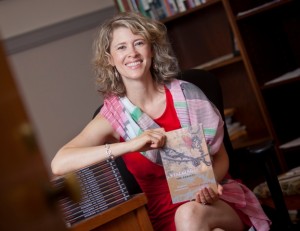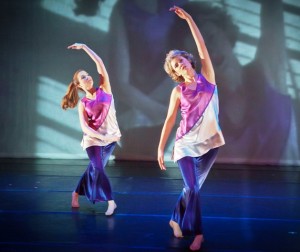Carrie Rohman, assistant professor of English, is quickly establishing herself as an influential voice in the interdisciplinary field of human-animal studies.
“The human-animal relationship is endlessly intriguing, in part because humans are primates, but they are also primates who tend to abstract or distance themselves from what we call nature,” she says. “The ways that we talk about, represent, and imagine other animals tell us a great deal about our values and also our desire to feel superior to the natural world. Moreover, in the last several decades, scientific research is confirming what has often been common sense both culturally and evolutionarily—that nonhuman animals are rather advanced cognitively and emotionally, and so our current ethical relationship to those beings has to be recalibrated.”

Professor Carrie Rohman teaches a course in Pardee Hall.
In her first book, Stalking the Subject: Modernism and the Animal, Rohman examined the discourse of animality in modernist literature. Her current book project, provisionally titled Aesthetic Animal: The Becoming-Artistic of Life, investigates links between human and nonhuman creativity to explore the idea that art is a more-than-human phenomenon. The project considers a wide range of sources, including representations of performance and animality in literature, books written by performance artists, historical figures in modern dance, and the theories and art works of choreographers and musicians.
Rohman eagerly shares her research with her students, and her enthusiasm for learning encourages them to be engaged, invested learners. She worked with English graduate Larisa Schuckle ’12 through the EXCEL Scholars undergraduate research program on Aesthetic Animal’s beginning stages. She also brings her expertise to courses like Representing Animals and the Values and Science and Technology seminar Creature: Humans and Other Animals in Contemporary Culture.
“Learning is transformative. It provides a lens upon the world and upon the self, and this is especially true in a college setting where students confront new ideas and develop new ways of understanding,” says Rohman. “This possibility for transformation fuels my enthusiasm as a teacher. Thinking critically, examining an issue from opposing angles, constructing an analysis of a poem, a paragraph, or a pop culture phenomenon—these become activities that challenge my students to explain how and why something is as it is. I strive to have students function as active producers of knowledge, to resist the easy ingestion of ideas and begin to think about how they have learned, how they are learning, and how they want to learn.”

Professor Carrie Rohman with her first book, “Stalking the Subject: Modernism and the Animal”
Colleagues are taking notice of Rohman’s advances in the field. At the 25th Annual Graduate Symposium in English, themed Biopoetics and Animal Aesthetics, held at SUNY New Paltz, she was introduced as “a leading scholar in the emergent interdisciplinary field of human-animal studies” prior to her keynote address. She also has given keynote talks at the 20th Annual International Conference on Virginia Woolf at Georgetown College and the Wesleyan University Human-Animal Studies Fellowship Program.
Since 2005, she has served on the executive committee for the Development of Human-Animal Studies in Academia, under the aegis of the Animals and Society Institute, a body that vets applications for the international fellowship in Human-Animal Studies in conjunction with the Wesleyan program.
Rohman was accepted into the 2013 Cornell School of Criticism and Theory, which is committed to rigorous debates about and developments of critical theory. There she worked with Jane Bennett, professor of political science at Johns Hopkins University, whose work in new materialism is important to the Aesthetic Animal project. Rohman recently published an essay in the journal Hypatia discussing the field of animal studies in relation to feminist theory.
Dancer/Choreographer
A semiprofessional dancer and choreographer, Rohman considers modern dance performance, choreography, and teaching her “lifelong avocation.” Before accepting her first academic position in English, she worked as an independent performer and choreographer in Cincinnati, Ohio, and is a former faculty member at Contemporary Dance Theater in Cincinnati. At Lafayette, she teaches the course Dancing Cultures: Embodying Performance.

Professor Carrie Rohman, right, performs at the Alvin Ailey Dance Theater in New York City.
“I’m a literary scholar and a dancer because I value the creation, experience, and appreciation of creative work,” says Rohman. “As a literary scholar, I specialize in the analysis and interpretation of works, whereas in dance, I’m more involved in the direct creation of artistic pieces. However, when performing others’ choreography, I’m very much doing a kind of interpretive practice.”
Dance offers the opportunity to collaborate with other dancers, poets, composers, and musicians. One of Rohman’s most fruitful campus collaborations has been with Nandini Sikand, assistant professor of film and media studies, who is co-founder and co-artistic director of neo-classical Odissi and contemporary dance company Sakshi Productions (Rohman is a member of the company). Sakshi Productions sponsored a two-day evening of dance last year at the Alvin Ailey Dance Theater in New York City.
For that engagement, Rohman worked with Kirk O’Riordan, assistant professor of music and director of Concert Band, to choreograph his original piece Night of Summer Stars, which was performed by the College’s Percussion Ensemble. She choreographed and performed an additional original piece and created an accompanying dance film with Sikand, Andy Smith, associate professor of English, and a team of student assistants.
Rohman previously collaborated with O’Riordan and the College’s Contemporary Music Ensemble for their performance of the experimental score The Seven Days by Karlheinz Stockhausen.



3 Comments
This comment goes to the 1st paragraph of the article. The comedy, Dogs and Cats, had it right. I swear that our dog studies me and gets me to do what he wants, furthermore, he seems to be wearing a watch. This timepiece is accurate to 15 minutes, because his dinner is long after sundown, but he knows. This animal knows when and how to ask for going outside, for being petted and for the above. He uses body language and he vocalizes. So, back to “Dogs and Cats”: Are we leading our animals or are they ruling us?
Hello Philip,
Please do send me an email at rohmanc@lafayette.edu. Your work sounds fascinating, and I’d love to hear more about it. The Animals and Society Institute is also launching a brand-new award program, the Humane Society University-Animals and Society Institute Human-Animal Studies International Development Project. We should talk more about the parameters of that program, given your commitments in Cameroon.
Best regards,
Professor Rohman
I would like the professor to write back to me because I am interested in the field of human-animal studies. I am a Cameroonian, an animal rights activist and defender of animal welfare.
I represent a British international animal charity in my country, Cameroon.
Thank you.
Philip
+23775732353
Comments are closed.